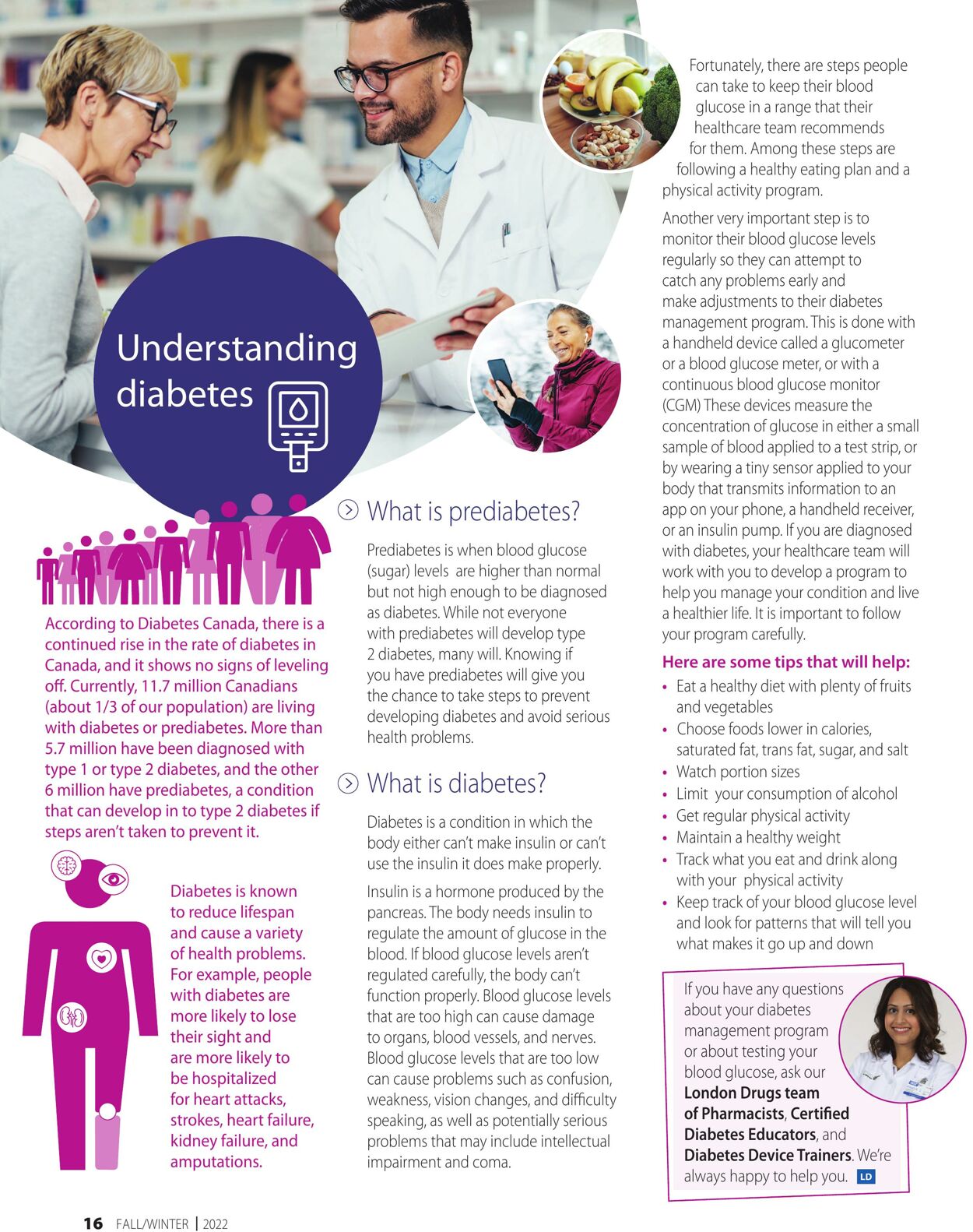













Les produits de cette circulaire
According to Diabetes Canada, there is a continued rise in the rate of diabetes in Canada, and it shows no signs of leveling off. Currently, 11.7 million Canadians (about 1/3 of our population) are living with diabetes or prediabetes. More than 5.7 million have been diagnosed with type 1 or type 2 diabetes, and the other 6 million have prediabetes, a condition that can develop in to type 2 diabetes if steps aren't taken to prevent it. Diabetes is known to reduce lifespan and cause a variety of health problems. For example, people with diabetes are more likely to lose their sight and are more likely to be hospitalized for heart attacks, strokes, heart failure, kidney failure, and amputations. 16 FALL/WINTER | 2022 © What is prediabetes? Prediabetes is when blood glucose (sugar) levels are higher than normal but not high enough to be diagnosed as diabetes. While not everyone With prediabetes will develop type 2 diabetes, many will. Knowing if you have prediabetes will give you the chance to take steps to prevent developing diabetes and avoid serious health problems. © What is diabetes? Diabetes is a condition in which the body either can't make insulin or can't use the insulin it does make properly. Insulin is a hormone produced by the pancreas. The body needs insulin to regulate the amount of glucose in the blood. If blood glucose levels aren't regulated carefully, the body can't function properly. Blood glucose levels that are too high can cause damage to organs, blood vessels, and nerves. Blood glucose levels that are too low can cause problems such as confusion, weakness, vision changes, and difficulty speaking, as well as potentially serious problems that may include intellectual impairment and coma. Fortunately, there are steps people can take to keep their blood glucose in a range that their healthcare team recommends for them. Among these steps are following a healthy eating plan and a physical activity program. Another very important step is to monitor their blood glucose levels regularly so they can attempt to catch any problems early and make adjustments to their diabetes management program. This is done with a handheld device called a glucometer or a blood glucose meter, or with a continuous blood glucose monitor (CGM) These devices measure the concentration of glucose in either a small sample of blood applied to a test strip, or by wearing a tiny sensor applied to your body that transmits information to an app on your phone, a handheld receiver, or an insulin pump. If you are diagnosed with diabetes, your healthcare team will work with you to develop à program to help you manage your condition and live à healthier life. It is important to follow your program carefully. Here are some tips that will help: + Eat a healthy diet with plenty of fruits and vegetables + Choose foods lower in calories, saturated fat, trans fat, sugar, and salt + Watch portion sizes + Limit your consumption of alcohol + Get regular physical activity + Maintain a healthy weight + Track what you eat and drink along with your physical activity + Keep track of your blood glucose level and look for patterns that will tell you what makes it go up and down If you have any questions about your diabetes management program or about testing your blood glucose, ask our London Drugs team of Pharmacists, Certified Diabetes Educators, and Diabetes Device Trainers. We're always happy to help you.
| Nom | Détails |
|---|